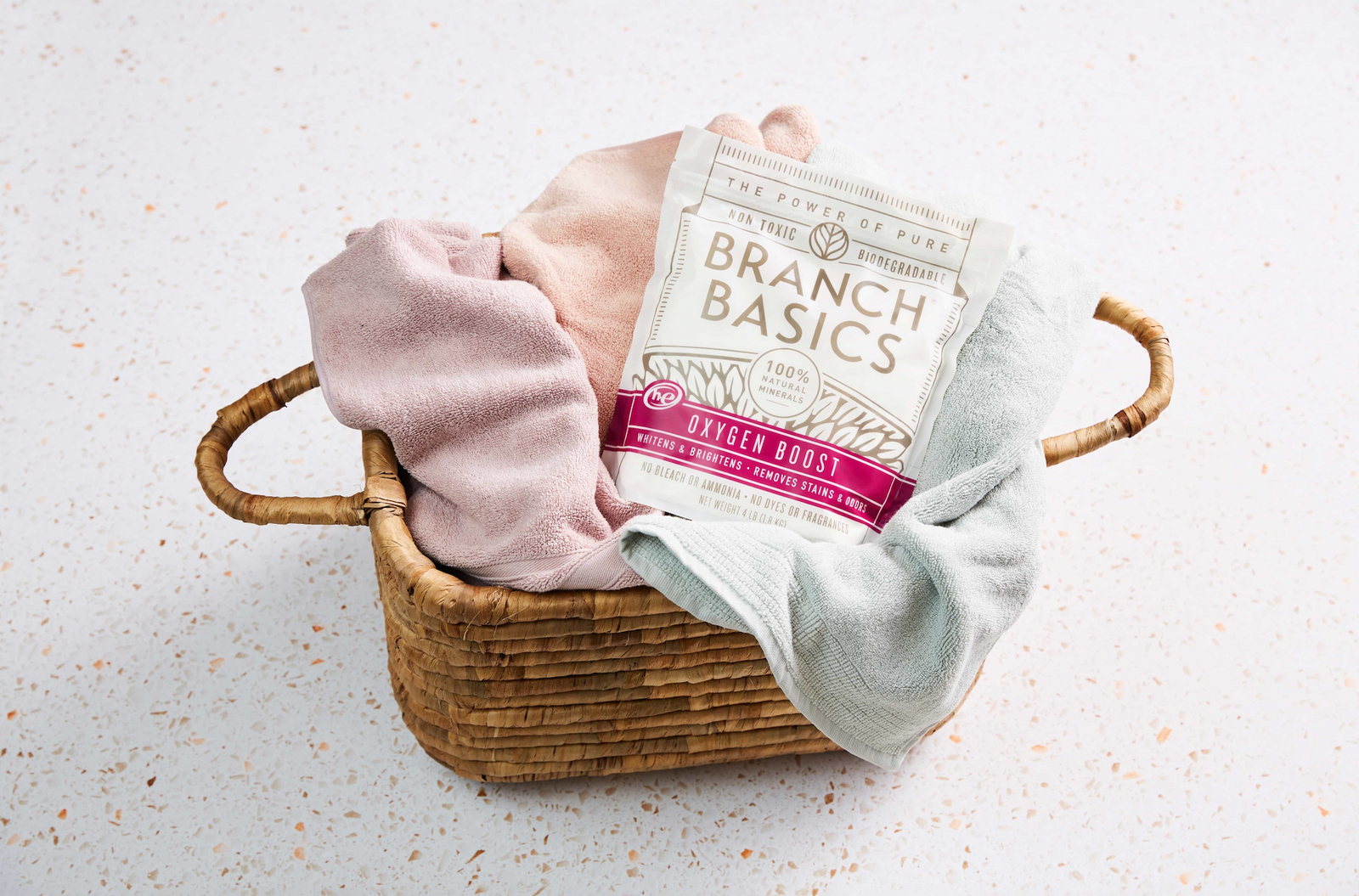7 Natural Fabric Softener Alternatives That Actually Work

Ditch the fabric softener? Heck yes!
Not only is it possible to have fresh, soft, and static-free laundry without costly fabric softener, but it’s much healthier for you and the environment.
In this article, we’ll share all about the health and environmental implications of ditching conventional fabric softeners and 7 natural fabric softener alternatives that really work.
Natural fabric softener alternatives are non-toxic, chemical-free products or ingredients that soften clothes, reduce static, and minimize wrinkles without using synthetic fragrances, quats, or petroleum-derived chemicals commonly found in conventional fabric softeners.
What Is Fabric Softener?
Fabric softeners are liquid, powder, or sheet-based laundry products designed to coat fabric fibers, making clothes feel softer, reduce static, and add fragrance. However, this coating can interfere with absorbency, trap chemical residue, and is largely unnecessary when safer, natural alternatives are used.
Some laundry detergents also include fabric softeners in their formulas.
How Does Fabric Softener Work?
Fabric softeners work a lot like hair conditioners. They contain chemicals that lubricate clothing fibers to create a softer feel and wrinkle-free finish.
Most fabric softeners also contain a signature scent that makes clothing smell extra fresh…
…but this freshness comes at a hefty cost.

Top 7 Natural Fabric Softener Alternatives
Are you ready to say goodbye to chemical fabric softener and improve your home’s air quality?
Natural Fabric Softener Alternatives at a Glance:
- Wool dryer balls (best all-around option)
- White vinegar (budget-friendly)
- Baking soda (odor-neutralizing)
- Essential oils (natural scent boost)
- Soap nuts (plant-based softening)
- Epsom salts + baking soda (DIY blend)
- Vegetable glycerin (gentle, fiber-safe)
Here are 7 natural fabric softener alternatives that really work.

1. Wool Dryer Balls
Wool dryer balls are widely considered the best natural fabric softener alternative because they soften clothes mechanically without leaving chemical residue. Wool dryer balls are our favorite natural fabric softener because they:
- Save time, energy, and money by absorbing moisture from clothing and shortening drying time 10-25% with a reduced heat setting.
- Reduce damage to clothes through lower temperature settings and shorter drying time.
- Cut down on static.
- Reduce wrinkles.
- Soften clothes, linens, and bedsheets.
- Help to fluff down feather quilts and jackets.
- Help bed sheets stay untangled during the drying process.
- Reduce lint on clothes.
- Grab pet hair from clothes.
- Freshen clothes.
- Work well with towels and cloth diapers by not diminishing towel or cloth diaper absorbency like chemical fabric softeners.
- Are natural, fragrance-free, and don’t damage your clothes or increase their flammability.
To learn more about the benefits of dryer balls, how to choose a quality brand (like ours!), and the nuances of using them, check out: Wool Dryer Balls: Gift From the Happiest Sheep To You.
2. Vinegar
Distilled white vinegar is one of nature’s best and most inexpensive cleaners. It also works wonders as a natural fabric softener.
- To use, add 1/2 a cup to your washer’s fabric softener dispenser, to a fabric softener ball, or directly to the final rinse cycle.
For more tips on cleaning with vinegar, check out: 12 Ways To Use Vinegar In Your Home.
3. Sodium Bicarbonate (Baking Soda)
Baking soda is right up there with vinegar as one of the most effective and economical all-natural cleaners.
- To use as a fabric softener, add 1 cup directly to the rinse cycle (you can even add it at the beginning, and it will work fine) and launder as usual.
Note: Avoid using vinegar or baking soda on delicate fabrics like silk or wool unless the care label explicitly allows it.
For more tips on using baking soda at home, check out: 12 Uses For Sodium Bicarbonate (Baking Soda)
4. Organic Essential Oils For A Natural, Laundry-Fresh Scent
If you’re hesitant to give up fabric softener because you love the scent, consider combining organic essential oils with wool dryer balls or another of these all-natural fabric softeners.
- Just add 5-10 drops of your favorite oil to add a lovely synthetic-chemical-free scent to your laundry.
When choosing essential oils, be sure to look for organic and/or wildcrafted 100% pure essential oils that have been steam-distilled or extracted without the use of chemical solvents.
5. Soap Nuts
Soap nuts are a great choice because their natural saponins clean clothes and act as a fabric softener.
- To use, place 4-5 soap nuts in a cotton bag and launder as usual.
Related: 6 Safe & Natural Laundry Room Essentials: A Complete Checklist
6. Epsom Salts + Baking Soda
Epsom salts aren’t just great for detox baths, muscle strains, and relaxing in the tub, they also work great as a fabric softener.
- To use, combine 2 cups Epsom salts with 1/2 a cup baking soda and add to your wash.
Consider purchasing Epsom salts and baking soda in bulk from your favorite price club to save money.
7. Vegetable Glycerin
This is a great tip for skin care DIYers and soap makers who have vegetable glycerin handy.
- To use as a fabric softener, mix 1 gallon of water with 1/2 a cup glycerin (add essential oils if desired) and add 1/2 a cup to the rinse cycle, fabric softener dispenser, or use a fabric softener ball.

Why You Shouldn’t Use Conventional Fabric Softener
Conventional fabric softeners and dryer sheets contain some of the most toxic chemicals commonly used in household products, including synthetic fragrances, quaternary ammonium compounds, and petroleum-derived lubricants.
They’re also terrible for the environment, can harm the integrity of your clothing, make clothes more flammable, clog up your washer and dryer, and are completely unnecessary.
Synthetic Fabric Softener Weakens Clothing Over Time
Like many synthetic chemical-based products, fabric softeners provide a short-term gain (softer clothes) in exchange for a long-term loss.
For instance, conditioning agents in various fabric softeners can build up in clothing fibers over time.
This causes two problems:
- It reduces the absorbency, air permeability, and moisture-wicking ability of fabrics.
- Over time, these conditioning agents build up and create a film on your clothing, which prevents laundry detergent from working properly.
The end result: less clean clothes loaded with fabric softener chemical residue.
Synthetic Chemical-Based Rinse-Cycle Fabric Softeners Can Make Clothes More Flammable
You read right.
Here we’ve been told never to leave our dryers unattended for fear of fire, yet we are sold fabric softeners that increase the flammability of our clothing.
In a peer-reviewed study conducted by Virginia Tech, titled: “Effects of Household Fabric Softeners on Flammability of Cotton and Polyester Fabrics,” scientists found that rinse cycle fabric softeners significantly increased the flammability of 100% cotton and 100% polyester fabrics.[1]
Researchers believe this is due to the lubricants in fabric softeners which are derived from tallow. Tallow’s fatty composition could increase the flammability of the fabrics.
You can read the entire research paper here, which also contains a fascinating history of fabric softener, its chemical composition, and a scientific breakdown of how it works.
Fabric Softener Can Build Up On Your Washer And Dryer
Over time, fabric softener can build up on your washer and dryer (those pesky tallow-derived chemicals again), reducing efficiency and leading to costly repairs.
Fortunately, you can get these harmful residues off your washer and dryer by following our washer and dryer detox tips.
It’s Completely Unnecessary
Although synthetic chemical fabric softeners do provide some benefits to clothing (not your health!), you can achieve the same results using completely natural or naturally-derived ingredients and inexpensive alternatives.
These alternatives are not only free from harmful synthetic chemicals, but they’re super-affordable, environmentally safe, and some are reusable.
Tossing the Toxins is Easier Than You Think
We hope this article has inspired you to try some natural fabric softener alternatives.
You can even do laundry without any fabric softener (using a natural laundry soap, of course) and see how it goes.
At Branch Basics, we’ve created a simple laundry system that allows you to wash, deodorize, and de-stain your clothes with just one Concentrate, water, and a reusable laundry bottle or with our new water-free Laundry Detergent.
We also offer a mineral-based biodegradable Oxygen Boost for tougher stains and brightening power.
Our products are Made Safe Certified, third-party tested as a non-skin or eye irritants, never tested on animals, and are made from natural plants and minerals.
See our Laundry Kit (available in plastic or glass) or Laundry Detergent to learn more.
Reference:

Marilee Nelson
Marilee Nelson is an Environmental Toxins expert who has spent nearly 30 years advocating for the chemically-sensitive and chronically-ill. She is a Board Certified Nutritionist, Certified Bau-Biologist and Bau-Biology Inspector and specializes in Food As Medicine. She has helped thousands of families and individuals identify, heal and recover from toxic exposures and is on a mission to revolutionize the way American families view their health.







